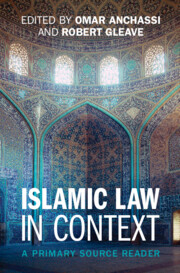Book contents
- Islamic Law in Context
- Islamic Law in Context
- Copyright page
- Contents
- Acknowledgements
- Contributors
- Introduction
- Part I Islamic Legal Theory (Uṣūl al-Fiqh) and Related Genres
- Part II Islamic Jurisprudence (Fiqh) and Related Genres
- Part III Legal Opinions (Fatwās)
- Part IV Court Judgments and Other Court Documentation
- Part V Judicial Manuals and Reference Books
- Part VI Alternative Sources for Islamic Legal Studies
- Chapter 38 Introduction to Part VI
- Chapter 39 Reform of Islamic Law in Nineteenth-Century Afghanistan
- Chapter 40 ‘Permission to Teach’ the Law
- Chapter 41 Controversial and Uncontroversial Biographies in Rayḥānat al-Adab of Mīrzā Muḥammad ʿAlī Mudarris (d. 1373/1954)
- Chapter 42 Battle of the Qāḍīs
- Chapter 43 Aḥlām al-Naṣr and the Islamic State’s Justification for Execution by Burning
- Name Index
- Subject Index
- References
Chapter 43 - Aḥlām al-Naṣr and the Islamic State’s Justification for Execution by Burning
Bal Aṭʿanā Allāh idh Aḥraqnāhu yā ʿAbīda al-Rafāhiya (2015)
from Part VI - Alternative Sources for Islamic Legal Studies
Published online by Cambridge University Press: 14 November 2024
- Islamic Law in Context
- Islamic Law in Context
- Copyright page
- Contents
- Acknowledgements
- Contributors
- Introduction
- Part I Islamic Legal Theory (Uṣūl al-Fiqh) and Related Genres
- Part II Islamic Jurisprudence (Fiqh) and Related Genres
- Part III Legal Opinions (Fatwās)
- Part IV Court Judgments and Other Court Documentation
- Part V Judicial Manuals and Reference Books
- Part VI Alternative Sources for Islamic Legal Studies
- Chapter 38 Introduction to Part VI
- Chapter 39 Reform of Islamic Law in Nineteenth-Century Afghanistan
- Chapter 40 ‘Permission to Teach’ the Law
- Chapter 41 Controversial and Uncontroversial Biographies in Rayḥānat al-Adab of Mīrzā Muḥammad ʿAlī Mudarris (d. 1373/1954)
- Chapter 42 Battle of the Qāḍīs
- Chapter 43 Aḥlām al-Naṣr and the Islamic State’s Justification for Execution by Burning
- Name Index
- Subject Index
- References
Summary
This chapter discusses the 2015 Islamic State (IS) publication Bal ʾaṭʿanā allāh idh aḥraqanāhu yā ʿabīda al-rafāhiyya (‘Nay, We Obeyed God When We Burned Him, You Slaves of the Luxurious Life’), which justifies the execution by immolation of Jordanian fighter pilot Muʿādh al-Kasāsba. The act prompted widespread criticism, sparking outrage across the Muslim world. This condemnation was even echoed within the Salafī jihādī, including the notorious Abū Muḥammad al-Maqdisī (b. 1959). The author of the piece, Shaymāʾ Haddād (b. 1992), more commonly known by her pseudonym Aḥlām al-Naṣr, exploits juristic disagreements in the medieval scholarly tradition to persuade the reader that immolation was never prohibited by the Prophet Muḥammad. Far from presenting the punishment of immolation as a timeless repetition of Prophetic custom, she claims that immolation is a necessary evil in a modern world where ‘incendiary weaponry’ (al-asliḥa fī hi ḥaraqa) - such as missiles, napalm, and cluster bombs - has become a norm in the conduct of war.
Keywords
- Type
- Chapter
- Information
- Islamic Law in ContextA Primary Source Reader, pp. 449 - 460Publisher: Cambridge University PressPrint publication year: 2024

